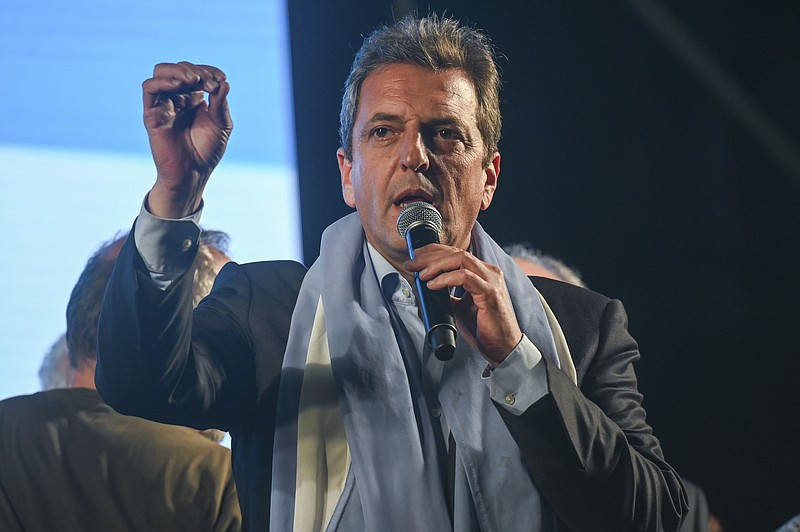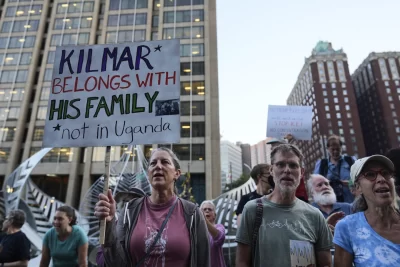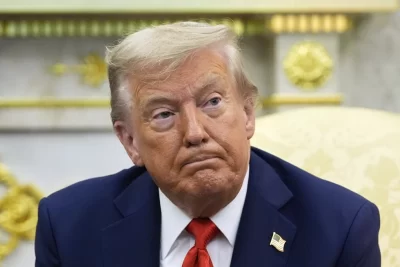
Argentina’s economy minister and the anti-establishment upstart he faces in a presidential runoff next month began competing Monday to shore up the moderate voters they need.
Economy Minister Sergio Massa earned almost seven points more than chainsaw-wielding economist and freshman lawmaker Javier Milei in Sunday’s vote. Most polls had shown Massa slightly trailing, as voters had been expected to punish him for triple-digit inflation that has eaten away at purchasing power and boosted poverty.
On Nov. 19 voters will either choose Massa, despite the economic deterioration that took place on his watch, or place their hopes in a self-described anarcho-capitalist who promises a drastic shake-up of South America’s second-largest economy.
Milei’s fiery rhetoric and radical proposals — like slashing subsidies that benefit a large swath of the population and replacing the local currency with the dollar — galvanized die-hard supporters, but cost him support among more moderate voters.
Massa focused his messaging in the latter part of the campaign on how Milei’s budget-slashing chainsaw would negatively affect citizens already struggling to make ends meet, with a particular focus on how much public transportation prices in Buenos Aires would increase without subsidies, said Mariel Fornoni of the political consulting firm Management & Fit.
Massa once again showed his Peronist party’s power to mobilize Argentine voters. A nebulous political movement named after former President Juan Domingo Perón that has both left- and right-wing factions but broadly believes in social justice and workers’ rights, Peronism has been a dominant force and in this election cycle emerged as the only viable left-leaning option.
Right-wing votes were divided between Milei, former Security Minister Patricia Bullrich of the main opposition coalition and another candidate, Cordoba province’s Gov. Juan Schiaretti. Bullrich finished third in the field of five candidates, and the runoff will be decided by where her voters ultimately migrate.
She said in her concession speech Sunday night that she wouldn’t congratulate Massa on his victory because he was part of “Argentina’s worst government,” and that her coalition would never support “the mafias that have destroyed this country.” She stopped short of endorsing Milei, however.
During the campaign, Milei harshly criticized Bullrich as part of the entrenched elite that required purging, but he sought to appeal to her voters in a radio interview Monday, suggesting that they should focus on the bigger picture.
“Everyone who wants to change Argentina, who wants to embrace the ideas of freedom, are welcome,” Milei said. “It’s not a matter of labels; it’s a matter of who wants to be on this side.”
Asked in a news conference Monday whether he foresees challenges in siphoning support away from Bullrich, Massa responded that “leaders aren’t the owners of votes” and that several views espoused by Milei “have nothing to do with our culture and the values of the average Argentine citizen.”
Massa also said he would not want his government to be characterized as only Peronist.
“I believe it’s a mistake to suggest that the upcoming phase should be tied solely to Peronism. We are heading toward a government of national unity. I will call upon the best from various political forces, regardless of their origin,” Massa said.
Massa had already told voters that he inherited a bad economic situation exacerbated by a devastating drought that decimated exports. He reassured them that the worst was past.
With nearly all ballots counted Monday, Massa, 51, had 36.7% of the vote and Milei, 53, had 30%. Bullrich got 23.8%
In his radio interview, Milei characterized Massa’s results as the minister’s “ceiling” and said his showing marked a “floor”.
Mauro Salvatore, a 23-year-old programmer, said outside Milei’s campaign headquarters Sunday night that he is optimistic Milei will pick up the votes that went to Bullrich in the first round.
“We have a clear possibility. We find ourselves in a situation we knew wouldn’t be easy, but you can see the Argentine people are tired and really want change, independent of whether it will be Milei or Bullrich,” said Salvatore, 23. “We have a lot of faith that some of Bullrich’s voters can be taken, given it’s understood they have more inclination toward Milei’s ideas than Massa’s.”
Analysts, however, questioned whether those votes would automatically transfer to him. Some of the more progressive elements of Bullrich’s coalition were already making clear Monday they would not support Milei, who has raged against the so-called “political caste,” vowed to eliminate half the government ministries and slash public spending.
And some analysts warned a runoff scenario may not be conducive to Milei’s combative style.
Milei is “an inexperienced candidate, lacking political expertise, who perhaps may not have the capacity to understand that the current scenario will require him to moderate, build political agreements, and appeal to voters who might ask for changes in his political proposal,” said Lucas Romero, head of Synopsis, a local political consultancy.
Milei’s casting himself as a culture warrior against the creep of the so-called “socialist agenda” appears to be a headwind, said Benjamin Gedan, director of the Latin America Program at the Washington-based Wilson Center. Milei has been endorsed by Brazil’s former far-right President Jair Bolsonaro and says he shares a common mission with former U.S. President Donald Trump. Some supporters wear hats that read “Make Argentina Great Again”.
Gedan described Milei’s opposition to abortion and gun control, among other positions, as “out of sync with Argentine society,” Gedan said.
Sovereign bonds plunged Monday and there was a selloff in Argentine equities as the market predicted that Massa’s first-round surprise means the government has little incentive to correct any of the economy’s imbalances for now. In the run-up to the vote, Massa boosted welfare programs and implemented tax cuts that benefited almost all registered workers, going against calls from the International Monetary Fund for austerity and removal of subsidies.
Massa “was able to build over the last two months through some tax holidays and other giveaways that could be fairly deemed populist,” said Brian Winter, a longtime Argentina expert and vice president of the New York-based Council of the Americas. “It’s going to be really interesting to hear what he says in the next few weeks, because he will need to win over some more moderate voters in order to win.”
___
AP reporters Patricia Luna and Almudena Calatrava contributed to this report.




